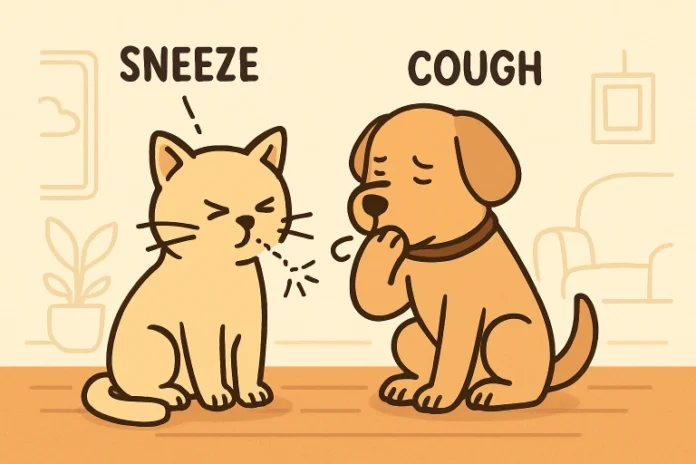Just as with people, pets can suffer from coughs and sneezes due to a variety of reasons. These symptoms aren’t just an inconvenience—they can be a sign of underlying health issues that deserve attention. Common culprits include infectious diseases, allergies, or more serious conditions, making it vital for pet parents to observe and understand these signals. If you’ve noticed your cat showing signs like these, it’s worth learning about cat coughing to protect their health and comfort better, and knowing why your pet is coughing or sneezing can help you provide timely care and avoid complications. Household factors such as dust, scents, or grooming products may also play a role in irritating your animal’s sensitive respiratory system. Early identification and response can make all the difference in supporting your companion’s health, whether they’re a playful kitten or a senior pup.
Table of Contents
Common Causes of Coughing and Sneezing in Pets
In many cases, coughing or sneezing in pets is a relatively minor issue caused by mild, short-lived irritants. Cleaning products, smoke from cooking, pollen, household dust, or perfume can briefly trigger symptoms. However, these signs may also point toward more persistent problems that need professional attention.
Infectious Respiratory Diseases
Respiratory infections are a prominent cause of coughing and sneezing in dogs and cats. These illnesses, which can be viral, bacterial, or fungal, commonly arise in social or crowded environments like shelters, kennels, or dog parks.
- Canine Influenza Virus: This contagious virus can result in coughing, sneezing, fever, and nasal discharge. Dogs may initially display mild symptoms, but in some cases, the illness can worsen quickly. According to AKC Health Resources, prompt identification helps prevent outbreaks and complications.
- Kennel Cough (Bordetella): This highly transmittable illness occurs most often in boarding facilities or multi-dog environments. Pets with kennel cough emit a persistent “honking” cough and may also sneeze or retch. Effective prevention includes vaccinations and minimizing exposure to infected animals.
Allergies and Environmental Irritants
Pets, much like people, can develop allergies to pollen, mold, dust mites, or specific foods. Seasonal allergies often cause runny noses, itchy eyes, coughing, or sneezing. Environmental irritants—such as air fresheners, candles, or cigarette smoke—can also aggravate the respiratory tract, particularly in sensitive or smaller breeds. Simple changes like using unscented products or keeping windows closed during high pollen times may help reduce symptoms.
Parasites and Foreign Bodies
Lungworms, heartworms, and nasal mites are parasitic causes of coughing in pets. These parasites damage the respiratory lining, leading to persistent symptoms. Occasionally, pets may inhale or ingest small objects—such as plant material, grass awns, or toy fragments—which become lodged and aren’t easily expelled. If you see your pet repeatedly pawing at their face or sneezing with intensity, a veterinary exam is vital to rule out foreign bodies.
Heartworm Disease
Mosquito bites transmit heartworms and are potentially fatal if untreated. Dogs are particularly vulnerable, but cats can also suffer from this disease. Early symptoms include bouts of coughing, fatigued behavior, and shortness of breath. Advanced stages may lead to heart failure. According to the American Veterinary Medical Association (AVMA), annual screening and monthly preventatives are the best protection against heartworm disease.
Tracheal Collapse
Tracheal collapse is a chronic, progressive condition most prevalent in small-breed dogs such as Pomeranians, Chihuahuas, and Yorkshire Terriers. It occurs when the cartilage rings in the trachea become weakened, resulting in a narrowed airway. A classic sign is a loud, dry, “goose honk” cough often triggered by excitement or pulling on a collar. Management may involve weight loss, harnesses rather than collars, or, in severe situations, surgical intervention.
Reverse Sneezing
Reverse sneezing commonly worries pet owners but is generally benign. It’s caused by sudden muscle spasms at the back of the throat, often in response to irritants, excitement, or rapid eating and drinking. Pets rapidly pull air in through their noses, creating a snorting or wheezing sound. While the episode may look distressing, most cases need no treatment.
Also Read : The Future of the Used Cars Business in Kuwait
When to Consult a Veterinarian
Occasional coughing or sneezing may not be cause for alarm, but you should contact a veterinarian if symptoms persist for several days, are accompanied by lethargy, loss of appetite, or difficulty breathing. Bluish gums, bloody discharge, or fainting spells require immediate emergency care. Early intervention helps manage underlying illnesses before they become life-threatening—a commitment every pet owner should make for their furry friend.
By understanding the wide range of causes behind pet coughing and sneezing, owners can make informed decisions and react quickly when symptoms arise. Regular wellness exams, preventative medications, and attentive home care are key to supporting happy, healthy lives for our four-legged family members.
